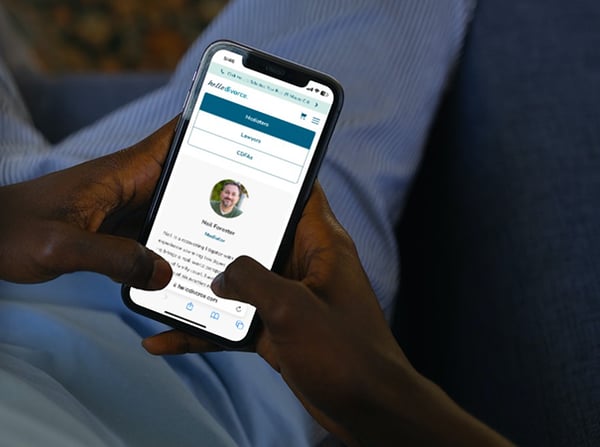We Are the Web's Divorce Mediation Specialists
- Stress-free and fast divorce filing process
- Use online mediation to come to an agreement for an uncontested divorce
- 100% online divorce and mediation
- Reduce resentment and come to an agreement without lawyers

How Much Does Using an Online Mediator Cost vs. an Attorney?
Divorce Software Plus Forms Specialist
$2,000
or 4 payments of $575
Use our easy divorce software, plus have dedicated help from our team to review, file, and serve all your divorce papers for you with guaranteed court acceptance.
- We review, file and serve all your forms
- We handle all court communication
- Continuous support for your divorce
- Add mediation time for $300/hr (no retainer)
Online Divorce Plus 5 Hours of time with Lawyers, Mediators, and Finance Pros
$3,500
or 4 payments of $1,000
Includes expert help for both spouses for your entire divorce. Use our software plus an expert to help you both review, file & serve all forms, and work with a mediator online to get to an agreement.
- Work with a mediator in your state to come to agreement
- Come to terms on asset division and parenting plans
- Stay out of court
- Start with or without your spouse
Hiring a Traditional Divorce Lawyer
$20,000+
no payment plans available
You might think that you have to use a divorce attorney to get divorced, but it's not the case. We've helped thousands of people divorce in a less stressful, messy way.
- $5,000+ retainer required to get started
- Slow, impersonal process
- Creates conflict with your ex
- Causes more fear and anxiety

We've helped thousands get an amicable divorce with mediation, and we're ready to help you, too.
Sometimes the difference between having a contested divorce and an amicable divorce is using a mediator. We're here to help you figure out how to start the divorce process and stay out of court, or continue with your divorce if you've already started.
Do You Need Some Extra Help with Your Divorce?
Are you worried that you and your spouse won't be able to agree on a divorce settlement? Get your free mediation guide to know how to plan for a less-stressful, more peaceful divorce with mediation.
%20(1).png)
What do our clients think about Hello Divorce?
Don't take it just from us. Find out what people who have gone through their divorce with Hello Divorce think about our process, our software, and life moving on to their next chapter. Then, give us a call to talk about how we can help you.
Hello Divorce Makes it Easy to Work with a Mediator for Your Divorce

Fill Out and File the First Paperwork
Filling out the Petition is the first step in the online divorce process. These papers tell the court and your spouse that you want to start the divorce process, but don't decide anything.
.jpg?width=600&height=447&name=smartmockups_lb5tuhuv-2%20(1).jpg)
Share Your Financial Disclosures With Your Spouse
Almost all states require some form of financial disclosures during the online divorce process. These disclosures are usually only shared with your spouse, not the court, and are meant to add transparency to the process.
.jpg?width=600&height=447&name=smartmockups_lb5v18nr-2%20(1).jpg)
Work On Your Agreement With Your Mediator
The Agreement step of the divorce process is the most important. It's where you and your spouse will outline the major decisions in your divorce, like custody, parenting plans, and division of assets. These will become court orders once your divorce is finalized.
Frequently Asked Questions about Online Divorce
What is divorce mediation?
Mediation is an informal and voluntary process where couples work with a neutral mediator or mediators to determine how to best restructure their lives and family. The key here is that the mediator, who is often an attorney, acts as a supportive neutral professional to assist you both equally as you work through the process. Unlike in a courtroom where a judge decides who gets what, who pays what, and how you will co parent, the couple gets to make those decisions in mediation.
So if the mediator doesn't make decisions like a judge, what do they do? The mediator is there to guide you and support you through every step of the process.
Is mediation a good idea in divorce?
Benefits of mediation for divorcing couples
Control
Mediation offers many benefits, the biggest of which is that you retain control over your divorce. You and your spouse will almost always be happier with the outcome if you decide the terms of things like child custody, spousal support (alimony), and property division outside of court.
Typically in divorce, a judge will step in and make important decisions for you and your spouse if you can’t make them on your own. That’s a total loss of control. But when you go to mediation instead of court, you maintain control over the negotiation process. Hence, you’re better able to achieve your divorce goals.
Privacy
Mediation allows you to protect your privacy, as any mediated settlement agreement remains confidential. In contrast, when you go before a judge, much of what happens could eventually become public record.
Money
Mediation definitely saves you money. How? If you and your spouse can resolve all of your issues before you go in front of a judge, you’re more likely to have a quick process in court, reducing your expenses. For things like child support, you and your spouse will likely come to a fairer, more reasonable agreement together. Mediation can also help you renegotiate financial matters later as situations change.
Peace
Going through mediation can be a more pleasant experience for you and your spouse than litigation. When you can effectively resolve your conflicts, you can overcome anything. Divorce is an emotionally charged process, but with a mediator guiding you, it’s often much easier to remain calm and reach suitable solutions together and often in a short amount of time.
Note: In cases of domestic violence or other safety concerns, a divorce mediator might not offer enough help. In that case, you may need to seek help from a family law attorney.
How do you start divorce mediation?
Most couples start mediation when they are ready to put together their agreement, which is the last phase of the divorce process. There are typically three phases of divorce mediation.
Mediation: Phase One
The mediator helps you to identify the issues you need to resolve to finalize your divorce. Generally, this includes how you will divide your property and debt, how you will co parent your children going forward, and issues of support, which include both alimony and child support if there are minor children. These are broad strokes, and there can be many sub-issues that fall under these broad categories. But again, that is one of the things that your mediator is there to help you with.
Mediation: Phase Two
Once the issues have been identified, your mediator will give you a general understanding of the laws surrounding those issues and any information you need to consider. They will be presenting that understanding from a neutral viewpoint, but it's important to get this from your mediator because you want the decisions you make to be informed decisions.
Mediation: Phase Three
With this foundation laid, your mediator will help you explore your issues and facilitate discussions about these topics. The goal of mediation is not to find a win for one and a loss for the other. Rather, it's to find the solution that best suits both of you and your family.
Ultimately, as you work with your mediator, you will each identify what you both can and cannot live with and the best way to achieves fairness as the two of you define it.
Why do couples go to divorce mediation?
Couples often mediate to reduce stress and have more control over the divorce process. You and your spouse are the only ones making decisions about what works best for your family.
In a litigated matter (read: both spouses have divorce attorneys who are fighting out the divorce), the ultimate decision-maker is a stranger wearing a black robe. Judges do their best, but they do not know you, nor do they know your family. In mediation, you and your spouse decide what you can and cannot live with and what works for your family going forward.
In the end, study after study has shown that agreements where both spouses participate are the ones that are successful and long-lasting. A mediated agreement gives you the best chance of success as you move past the divorce.
It is possible to do mediation online, which some couples find a huge benefit. Online mediation sessions allow a couple to conveniently schedule their sessions and participate from their home or office. Regardless of your geographical location, you and your spouse can discuss your divorce and come to agreements face to face. In so many ways, the online platform allows for a more seamless, less stressful process for you both.
Does California require mediation for divorce?
In most cases, no, California will not require mediation for divorce. However, there are some child-custody related issues that may mean court-ordered mediation is required.
In California, a judge will order couples to mediate child custody issues if they have minor children together but haven't been able to agree on a parenting plan during their divorce process. Mediation will also be court-ordered if a parent requests any court order related to child custody in California during the divorce process or after the divorce is finalized (meaning the parents haven't agreed on the issue and one parent is taking it to court), or a stepparent or a grandparent has requested visitation with a child.
Parents who don't participate in court-ordered mediation may lose the right to challenge the court's custody orders. At the same time, parents must receive a reasonable amount of time to prepare for mediation, so that they can participate in a meaningful way. Any parent also has the right to take part in mediation of a grandparent's or stepparent's visitation request, but a parent who doesn't participate may not object to a settlement reached during that mediation.
Does Colorado require mediation for divorce?
Even though Colorado state law doesn't require judges to order mediation for divorce, in most cases where spouses or ex-spouses have disputes Colorado judges will typically order mediation, and often early in the process.
Colorado courts really want spouses to come to an agreement in their divorce case without litigation and having the courts decide how to split assets and share custody.
If a judge hasn't already referred the case to mediation, one spouse may request a referral order—for instance, if you want to mediate but your spouse doesn't.
Does New York require mediation for divorce?
If you and your spouse are in an uncontested divorce in New York, you will typically not be required to mediate (though if you need help coming to an agreement so your divorce remains uncontested and out of court, mediation is a great option.)
Since 2019, for contested cases, presumptive mediation is happening more and more in New York. Presumptive mediation is when your contested divorce case is referred to mediation by the court when you file.
Does Texas require mediation for Divorce?
Does Utah require mediation for divorce?
In Utah, mediation is only made mandatory by the court when a divorce is filed with contested issues, meaning you and your spouse have issues upon which you cannot agree.
In such cases, the court mandates at least one mediation session, though you are welcome to participate in more if it’s helpful for you. However, if, after your one mediation session, you don’t feel it’s helpful, the court will move along with the divorce process.
You are required to select and contact a mediator within 15 days of the respondent spouse filing an Answer to the divorce Petition. Then, you must begin the process of mediation within 45 days. Learn more here.

Every Situation is Unique, and We're Here to Guide You
Our warm, empathetic team can help answer your questions about the divorce process, how to get started, and what your options are for your specific situation.
